


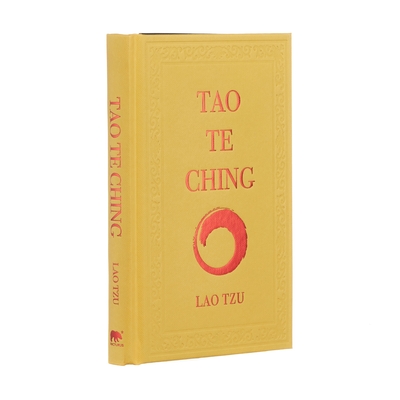
The Tao Te Ching came into existence some 2500 years ago, since when it has become the most influential text of Eastern philosophy. Best translated as The Classic of the Way and its Power (or Virtue), its teachings are of simplicity, humility and 'non-action', and its cadenced poetry is at once spare and profound. This beautiful compact hardback edition, with gilded edges and foil on the cover, makes a wonderful gift.
ABOUT THE SERIES: Arcturus Ornate Classics are beautifully bound gift editions of iconic literary works from across history. These pocket-sized, foil-embossed hardbacks are printed using deluxe ivory paper and custom endpapers.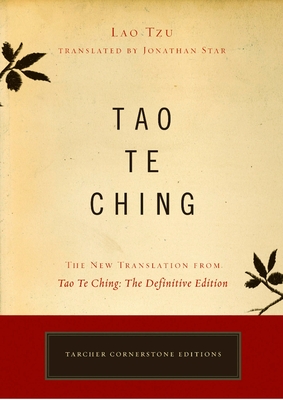

A groundbreaking and superlatively accurate new translation of Laozi's The Dao De Jing, from the bestselling translator of The Art of War, promising to be the first English edition based on direct translation from the oldest known copies of the ancient Chinese text.
One of the most significant and popular books in the history of human thought, and China's earliest philosophical classic, The Dao De Jing has served for millennia as a brilliant guide to living healthily and happily, to treating the Earth with respect, and to understanding our place in the cosmos.
The Dao is as vitally important to today's world as it was during the Bronze Age, presenting us with clear and unexpectedly sane answers to some of the most pressing questions and challenges of our time. This beloved classic teaches us to become one with nature, with all people, and with the world; with the ultimate intention of illuminating the path to peace and promoting the conditions for harmony--within the self and in the greater world around us.
Renowned translator J. H. Huang has spent over two decades researching the Dao, resulting in the most accurate translation to date based on the oldest known transcripts of the text. Huang's translation is the first to incorporate four major archaeological findings, which have been preserved for millennia in ancient tombs, most of which were only discovered in the late twentieth century: the Guodian Chu slips, the Mawangdui silk texts, the Fu Yi version, and the Peking University bamboo slips. Huang argues that these key source materials contextualize The Dao De Jing much in the same way the Dead Sea Scrolls illuminate the New Testament. The result is a groundbreaking translation that offers readers the first opportunity in over two millennia to thoroughly comprehend all of the teachings contained in these eighty-one chapters.
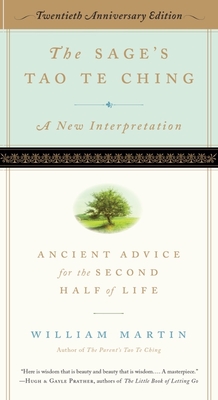




Draws on Guo Xiang's commentary on the Zhuangzi to construct an account of freedom that is both metaphysical and political.
This book starts with the radical premise that the most coherent way to read the Zhuangzi is through Guo Xiang (d. 312 CE), the classic Daoist text's first and most important commentator, and that the best way to read Guo Xiang is politically. Offering an investigation of the notions of causality, self, freedom, and its political implications, the book provides a comprehensive account of freedom that is both ontological and political, using Guo's notion of self-realization (自得zide). This is a conception of freedom that introduces a dependence-based autonomy, in which freedom is something we achieve and realize through our connection to others. The notion that a subject is born with freedom-and that one can return to it by isolating oneself from others-would be a strange idea not just to Guo but to most Chinese philosophers. Rather, freedom is complex and frail, and only the kind of freedom that is collectively attained through radical dependence can be worth having. In sum, the book makes a new contribution to Chinese philosophical scholarship as well as philosophical debates on freedom.


Presents an iconoclastic account of morality and moral discourse from the perspective of Daoist philosophy.
Drawing on both western and Chinese philosophy, Those Who Act Ruin It shows how Daoism presents a viable alternative to established moral theories. The Daoist, critical of the Confucian and Mohist discourses of their time, provides an account of morality that can best be understood as achieving an attunement to situations through the cultivation of habits. Furthermore, Daoism's meta-ethical insights outline how moral philosophy, when theorized in a way that ignores our fundamental interdependence, devolves into moralistic narcissism. Another way of putting this, as the Daodejing states perfectly, is that those who act ruin it (為者敗之). Sensitive to this problem, the Daoist account of moral attunement can ameliorate social woes and not ruin things. In their moral attunement, Daoists can spontaneously respond to situations in ways that are sensitive to the underlying interdependence of all things.


Tao Te Ching is the 2,500 years old source to Taoism, written by the legendary Taoist philosopher Lao Tzu. In 81 short chapters, he presented the world according to Tao, the Way, and how mankind should adapt to it. The book has become one of the foremost world classics of wisdom - maybe even more relevant today, than it was to Lao Tzu's contemporaries. This translation of the text focuses on the clarity and simplicity by which Lao Tzu expresses his fascinating cosmology and profound ethics. Except for a short foreword by the translator, Lao Tzu's text is uncommented in this edition, allowing it to speak for itself. Stefan Stenudd has also published an edition with extensive comments and explanations: Tao Te Ching. The Taoism of Lao Tzu Explained.

This classic work of Chinese mysticism was written over 2500 years ago. It author was Li Er, an enlightened sage and scholar known to the world as Lao Tzu (Venerable Master), who espoused a philosophy of the Way, or 'Tao' a method of non-striving existence, an effortless 'going with the flow'. Poetic, Humorous, Wise, Deep-hearted, and at times frustratingly enigmatic, the 'Tao Te Jing' is required reading for any student of mysticism and philosophy. It is also the perfect antidote to our contemporary materialist culture of acquisition and self-aggrandisement.

The Dao De Jing (also called the Tao Te Ching) was written more than 2,500 years ago and is considered one of the most important books in world literature. Coming in at only 5,000 Chinese characters, its timeless wisdom has inspired millions of people around the world and serves as one of the cornerstones of the Taoist religion.
It has been translated into English many, many times, but this new work by the best-selling writing team of Jeff Pepper and Xiao Hui Wang is much more than a translation. The authors have taken the unusual step of not just giving you the English translation, but also showing, word by word, how one gets from the original Chinese characters to the English version.
Each of the 81 short chapters contains a beautiful English translation, followed by a word-by-word and line-by-line breakdown of the chapter, showing the original Chinese, the pinyin (phonetic spelling in English characters), a word-for-word literal translation into English, and occasional helpful notes to help the reader better understand the translation. The result is a book that can be read casually, or studied carefully, or anything in between.
This new translation expresses the DDJ in simple language that anyone can access. In their Authors' Notes they say: This is a book for ordinary people, not scholars. Many DDJ translations have been created by scholars for other scholars, and while we have studied many of them and owe a debt of gratitude to those scholars, we feel that the DDJ's message is simple, practical and universal, and we want everyone to have the chance to benefit from it. We try to follow the guidance of Laozi in Chapter 70, who tells us, in his usual elliptical way: My words are very easy to understand, very easy to practice. In this world, they can't be understood, and can't be practiced.
It's impossible to do a 100% literal translation of the DDJ. Ordinary modern Chinese is quite different from Western languages, and the language used in this book is even more different. To start with, the original DDJ is extremely compact. Its verses have very few connecting words, forcing the reader to think deeply about the verse in order to tease out its underlying meaning or meanings. Some words can, depending on context, serve as nouns, verbs, adjectives or adverbs. Verbs in Chinese generally have no past, present or future tense, nouns have no gender (male/female), and no number (singular/plural). And to make things even more difficult, helpful little words like prepositions and pronouns are often missing entirely. As a result, translating literally from Chinese to English usually results in gibberish. Pepper and Wang have added just enough connecting words so that the sentence makes sense, while still expressing Laozi's thoughts as concisely as possible. They've also tried really hard to avoid the temptation to add things that weren't already there in order to make the sentence more readable.
A Pocket Edition of this book is also available. The Pocket Edition contains only the English translation, not the original Chinese or the detailed translation notes. It's only 114 pages vs. 380 pages, and it's a smaller size (5x8 instead of 6x9), making it a better fit for the pants pocket.

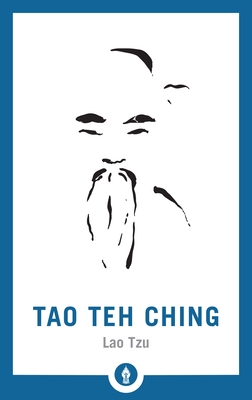

An insightful guide on how to use the ancient wisdom of the I Ching for guidance through the trials of modern life
The I Ching is one of the oldest and most widely used divination systems ever devised. Since ancient times it has provided its readers with insight into their own lives and guidance for the future. All too often, however, the available translations have blurred the basic message of the I Ching's hexagrams and obscured their relevance. Utilizing the knowledge gained from many years of using the I Ching in her practice, psychotherapist Sarah Dening provides, with this translation, a valuable resource that should be consulted daily as one would a trusted friend. Dening details how to use and read the I Ching's hexagrams and gives insight on how to relate the ancient wisdom of the I Ching's hexagrams to the trials and tribulations of everyday modern life. The Everyday I Ching fills the long-standing need for a clear, focused rendering of the I Ching--one which makes its timeless wisdom accessible to everyone.
Grounded in a lifetime of research and interpretive work and informed by careful study of recent archeological discoveries of alternate versions of the text, Brook Ziporyn, one of the preeminent explicators of Eastern religions in English, brings us a revelatory new translation--and a radical reinterpretation--of the central text of Taoist thought. Ziporyn offers an alternative to the overly comforting tone of so many translations, revealing instead the electrifying strangeness and explosively unsettling philosophical implications of this famously ambiguous work. In Ziporyn's hands, this is no mere wisdom book of anodyne affirmations or mildly diverting brain-teasers--this pathbreaking Daodejing will forever change how the text is read and understood in the West.
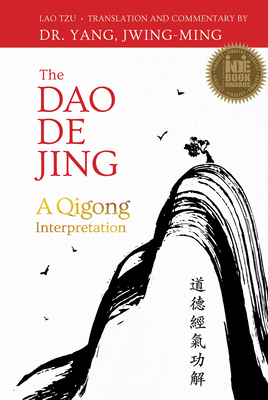
An elegant and comprehensive critical edition of the Dao De Jing. ― KIRKUS Review
This book examines one of the world's most enduring and influential literary works through the timeless art of qigong. In his words, Lao Tzu (or Laozi), author of the Dao De Jing, embodies qigong principles, advocating the cultivation of mind and body. Only when we know qigong can we know Lao Tzu--and only when we know Lao Tzu can we know the Dao De Jing.
Lao Tzu's writing has been read, translated, and discussed around the globe. It deals with principles that transcend time and culture. That is why this ancient text has been reimagined countless times in books on business, relationships, and parenting--but never with a focus on the art of qigong. This makes the Dao De Jing: A Qigong Interpretation unique and indispensible.
Many chapters in the Dao De Jing purely talk about qigong, especially the practices of regulating the body, breathing, mind, qi, and spirit.
Dr. Yang, a renowned author, scholar, and martial artist, devoted decades to researching and writing this book. He interprets and analyzes the 81 chapters of the Dao De Jing. His commentary will bring new insight, inspiration, and depth to your understanding of Lao Tzu's words--and to your qigong practice.
This book includes
The Dao De Jing: A Qigong Interpretation is not a book of instruction. It is about the Way--the path before us, in qigong and in life, where what you achieve comes through your own understanding.